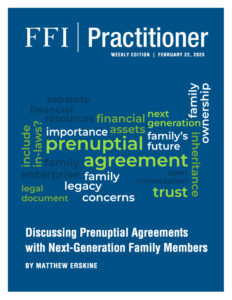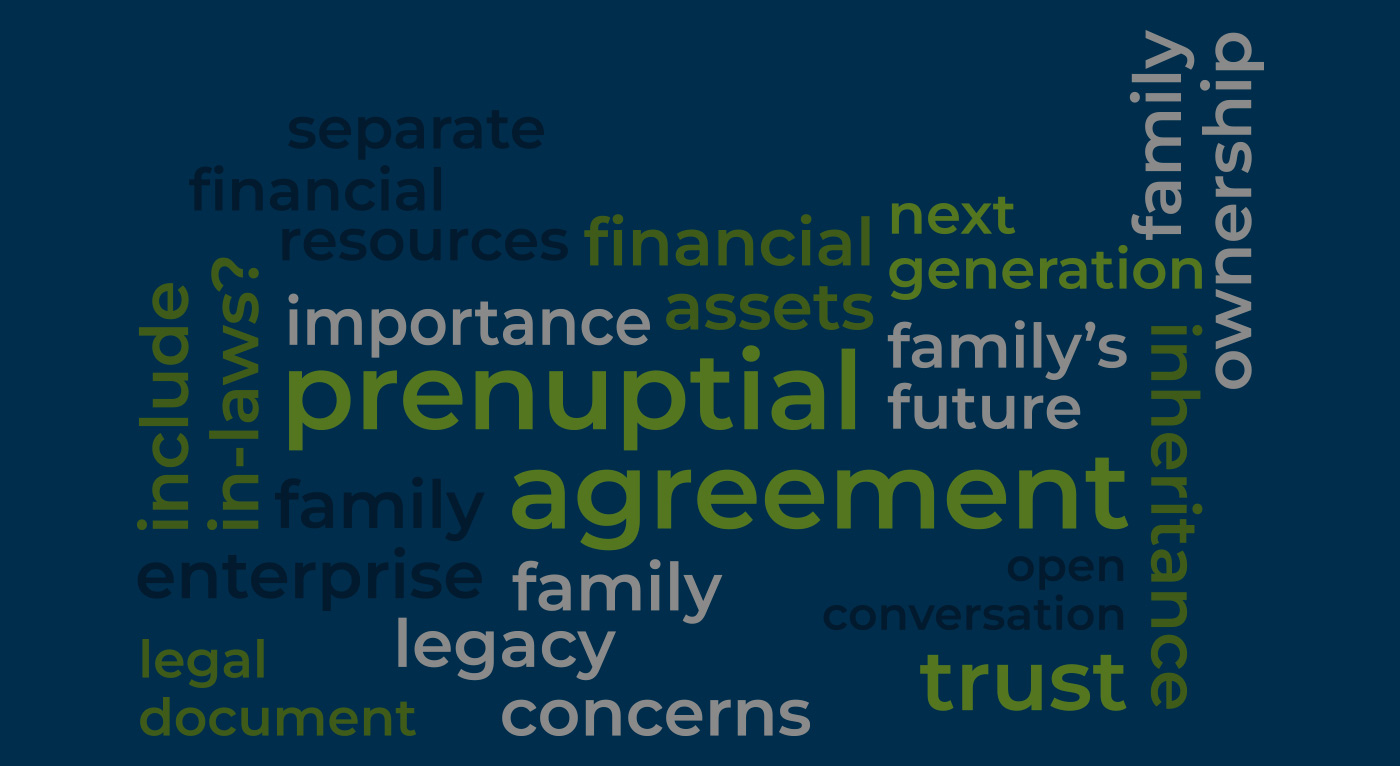
View this edition in our enhanced digital edition format with supporting visual insight and information.
In this week’s issue of FFI Practitioner, Matthew Erskine considers the ways that a prenuptial agreement can be an effective tool for family enterprises not only to protect family assets, but to articulate their philosophy and vision for the family’s future.
A prenuptial agreement is a legal document that describes how a couple, after they are married, will handle their financial assets and the assets inherited by each from their respective families. Hollywood movies have portrayed the act of seeking a prenuptial agreement as one of control and mistrust, but a prenuptial agreement is not solely about controlling wealth. It involves a family’s legacy, which includes wealth but also much more. So, how can a family enterprise advisor help his or her client move away from thinking primarily about a prenuptial agreement that focuses on financial assets to considering and creating a prenuptial agreement that considers both financial assets and the family legacy concerns?
Similar to most legal documents, prenuptial agreements can vary greatly from one jurisdiction to another. For example, even within the United States, individual states may have distinct requirements for the process to create a prenuptial agreement as well as rules governing how various forms of property may be treated in the absence of a prenuptial agreement (i.e., community property states). The purpose of this article is to provide family enterprise advisors with practical guidance about how to engage their clients in productive discussions with the rising generation about the topic of prenuptial agreements.
When a family enterprise client has a family member who is contemplating marriage, the family may fear that its assets—particularly family businesses, legacy real estate, and other assets with high emotional as well as financial value—could be at the eventual risk of falling under the control of an in-law (or worse, a resentful ex-in-law) who is unable to manage the family assets or preserve ownership within the family. How can advisors effectively address their clients’ fears while at the same time helping their (often younger) family members constructively address this sensitive topic?
One potential method is to say that prenuptial agreements are “just what the family does.” The prenuptial agreement can take the topic of money off the table and allow the marriage to occur for all the other positive reasons like love, friendship, and family. Although well intentioned, this is an approach which does nothing to address the reality that any topic involving money is rife with anxiety.
An alternative approach is for an advisor to help his or her clients articulate their agreed-upon philosophy about succession of ownership of family assets, without being skewed by a specific future in-law whom they may like or dislike. This approach requires mediating an open conversation between multiple generations of family members who own an interest in the family’s assets. In this conversation, family members can explore and understand one another’s feelings, concerns, and desired outcomes around family money and a prenuptial agreement, including the following questions:
- What is the symbolic and practical importance of a prenuptial agreement?
- What does a prenuptial agreement aim to accomplish?
- What worries does the family have about its members getting married/divorced in the future?
- What is the best way to bring next-generation family members into a conversation about a prenuptial agreement?
- Which family member(s) will be allowed to make the final decision about prenuptial agreements for the family? Will the requirements for all family members’ prenuptial agreements be substantially the same?
- What is the family’s approach to the potentially divisive topic of whether to include in-laws in the ownership and control of family wealth?
It is important that each generation understands the family’s feelings and opinions on this topic so that they are all “singing from the same page” when it comes time to discuss the topic of prenuptial agreements with a family member contemplating marriage.
The next step is for the advisor to assist the family (most likely the parents) in engaging each member of the next generation in a conversation about the family’s philosophy about prenuptial agreements before the engagement takes place. Some families may choose to have separate conversations with each member of the next generation, while others may prefer to speak with everyone collectively. Some questions for this discussion include those below:
- What is your dream for the future of your family?
- What is the purpose of inheritance for the next generation?
- How could the next generation maintain separate financial resources and have a viable marriage?
- What obstacles does the next generation see in creating a prenuptial agreement?
This conversation requires the entire family to be open and honest about the sensitive and difficult topic of money and wealth, even before a “significant other” enters the picture. If a next-generation family member is already in a serious relationship, it will often be more challenging to remain objective about financial matters—for both the parents and their children alike.
The goal is a document that creates a sense of family ownership and a desire to maintain the family legacy. This family conversation can build trust and understanding between the generations, whether or not the family members eventually decide to move forward with prenuptial agreements.
Note
*This article does not address the potentially differing approaches to discussions of prenuptial agreements with family members in the same generation as the founders, although those discussions often are equally necessary for the orderly transfer of family wealth and stewardship of the family enterprise.
Disclaimer: The views expressed in this article are those of the author only. The information contained in this article is provided solely for informational purposes. This article does not constitute legal advice or create an attorney-client relationship. Because of the generality of this article, the information provided herein may not be applicable in all situations or in all jurisdictions and should not be acted upon without specific legal advice from a licensed attorney based on particular situations.
About the contributor

Matthew Erskine is the managing partner of Erskine & Erskine LLC, a fourth-generation law firm, and The Erskine Company, LLC, a consulting firm. He focuses on strategic planning and legal services for business owners, professionals, individuals, families, collectors, and inheritors of unique assets, helping his clients and their families solve their problems through customized estate, tax, and management solutions. Matthew can be reached at m.erskine@erskineco.com.

View this edition in our enhanced digital edition format with supporting visual insight and information.





